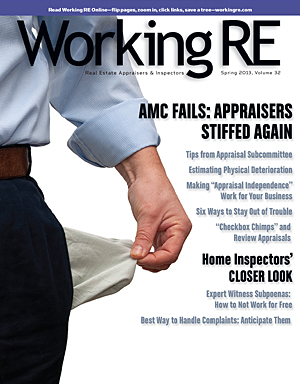|
Published by OREP, E&O Insurance Experts | July 30, 2013 |
 Print: Click to read current issue Am I a Working RE Paid Subscriber? |
>
Click to Print
|
Recently, with agents and buyers losing out on money and time due to “low”
appraisals, it’s no surprise that appraisers are increasingly at risk of being
taken to court with threats of losing their license for unsupported value
opinions- from both well-supported appraisals and those poorly done.
Editor’s Note: Appraiser and real estate broker
Justin T. Stevens explains the cause and effects of appraisals that come in “too
low.”
About "Low" Appraisals
by Justin T. Stevens
There are well-supported
appraisals that come in low, and then there are poorly prepared appraisals that
come in lower than they should which hurts everyone involved. Here are
some causes and effects.
A low appraisal is an adequately supported value opinion where the
appraiser utilizes and analyzes all applicable data necessary to produce
credible assignment results. A low-ball appraisal, to use the term
loosely, is an inadequately supported value opinion, where the appraiser has not
analyzed all the applicable data necessary to produce a credible assignment
result- either because they can’t or won’t take the time to do so.
All parties involved in a transaction can be negatively affected by an
inadequate appraisal valuation, including agents, buyers, sellers, escrow and
title companies, lenders, and finally, appraisers. Agent-client relationships
become strained, buyers are forced to come up with out-of-pocket cash, sellers
aren’t getting fair market value- all parties end up working for no pay- except
the appraiser. I want to be clear again that not every “low” appraisal is a
“low-ball” appraisal. Here’s the difference.
Lag Time
Low valuations can be expected when adjustment times lag from a declining to
an increasing value trend or where there is a lack of available market data.
What is happening today is different. This is certainly not what anyone expected
to happen when the real estate market finally rebounded. It’s no secret the
current market has changed dramatically over the past 12 months, with today’s
reality being low inventory and high demand for residential properties.
(story continues below)

(story continues)
National economic reports indicate that property values have increased over the
past year, and the forecast shows the trend will continue. If this is true, why
are there multiple above-list price offers with appraisals not supporting full
sales price? While I agree that some appraisals are legitimately supported at
lower than sales price values, I also find that many are not.
Cause and Effects
Why are so many appraisals coming in low? Based on my research and
experience I see the following reasons:
Market Conditions
Artificially low valuations are most often due to the lack of understanding
of current market conditions and market extraction methods. The most accepted
and utilized approach to value, the “Sales Comparison Approach to Value,” bases
the appraiser’s value support on past comparable sales data. The weakness
here is that utilizing past comparable sales do not allow for current
supported values, unless you consider a positive adjustment in today’s market
due to appreciation caused by low supply and high demand. The support for a
market condition adjustment is the most underutilized yet one of the most
necessary adjustments in today’s market.
Bad Mentor, Bad Habits
When a real estate appraiser first enters the profession, that person is
required to work under and learn from a supervising appraiser, to receive the
necessary hours required to earn their license and work on their own. The new
trainee, more often than not, becomes a reflection of their mentor, taking on
the good traits as well as the bad ones. The limitations of the mentor, their
experience and training, now affect the quality of the newly-minted appraiser.
Lack of Market Experience
Consider how often market values increase, decrease or go through a
stabilization period. The housing prices reached a peak nationally in early
2006, and started their decline in 2006-2007. The S&P/Case Schiller home
price indices reported a national increase of 7.3 percent in the fourth quarter
of 2012. The increase in value can be much higher from neighborhood to
neighborhood throughout the U.S. I’ve personally extracted market condition
adjustments in my local areas of 12 percent for 2012. So if the market has been
either declining or stabilized for the past five to six years, this likely
implies that very new appraisers have had no actual experience of applying
support for increasing market conditions. More seasoned appraisers have not
practiced or applied appropriate techniques in a while, in some cases.
Ironically, this also occurred as prices began to decline after years of doing
nothing but increasing. To keep up to speed, an appraiser would have to have
been proactive in seeking knowledge and practicing various approaches without
being compensated. Many do, many do not.
Under Pressure
Appraisers have taken a huge hit financially and are being stretched by
unreasonable turn time demands and low fees.
(Read
Survey
Results: How Reasonable Are Appraisal Turn Times?
at
WorkingRE.com, Library, Volume 32). Many are not
receiving fees commensurate with the time required to prepare a quality
appraisal. For example, today’s market offers an extremely limited supply
of recent comparable sales data. As a result, appraisers must apply approaches
to value which are complex and require extraction methods that haven’t been
practiced in years. Appraisers are being asked to accomplish more for less pay,
and if they don’t accept the fee and turnaround time, someone else will.
Again, just because a valuation comes in lower than the sales price doesn’t mean
the appraiser provided an inadequately supported valuation. As I describe above,
there are many causes of a “low-ball” appraisal. Ultimately, it is the
appraiser’s responsibility to be ahead of market trends and to completely
understand that the approaches to value are neither the same as the past nor the
same in every market area.
Negative Effects
When the agent prepares the offer to purchase the property for the buyer,
the default verbiage of the purchase contract states that the buyer’s purchase
at full offered sales price is contingent upon the appraisal
supporting the sales price (page 2, letter I, of the Residential Purchase
Agreement). However, removing this contingency is a prime negotiating tool in
today’s market, in order for financing to compete with all cash offers. At face
value, the removal of the appraisal contingency is very appealing to sellers,
especially when many appraisals aren’t supporting the sales price. Cash offers
require no appraisal. However, removal of the appraisal contingency creates risk
for the buyer unless they are very knowledgeable in appraisal methodology.
(story continues below)

(story continues)
Removal of the appraisal contingency means that the
buyer accepts and agrees to pay the difference between the appraised value and
sales price above and beyond the amount they are already putting down for their
loan. If the difference between the appraised value and sales price is more than
what the buyer can, or is willing to pay to close the transaction, the buyer
would forfeit their deposit—typically between $5,000 and $10,000 – with no
property to show for it.
The seller may have a property listed longer than expected where the appraisal
does not support the contracted sales price; the buyer backs out if appraisal
contingency is active. If the seller accepts an offer from a buyer who intends
to obtain Federal Housing Administration (FHA) financing and the FHA-appraised
value comes in lower than sales price, that FHA appraisal is now attached to
that property for 120 days and must be used for all other subsequent FHA buyers
at the lower value.
We appraisers are receiving more and more revisions from lenders, although these
are mainly due to not meeting a client’s requirement for verbiage or comments to
their specific criteria. Recently, with agents and buyers losing out on money
and time due to “low” appraisals, it’s no surprise that appraisers are
increasingly at risk of being taken to court with threats of losing their
license for unsupported value opinions- from both well-supported appraisals and
those poorly done.
After reviewing thousands of appraisals and working with hundreds of appraisers
throughout the country over the years, it’s my observation that appraisers with
inconsistent standards give a bad rap to the appraisers who truly strive for
high quality work.
About the Author
Justin T. Stevens is founder of
eValuePort. He is a Certified appraiser
and DRE licensed broker associate with TNG Real Estate Consultants. As an
independent appraiser, also serving in support and supervising positions for the
National Review of Appraisals for the past 13 years. He is also a REALTOR® in
Orange County, CA assisting buyers and sellers with their residential and
commercial needs. Both positions allow him to review and comment on the real
estate industry from a more comprehensive perspective.
>
Click to Print
this Article
ATTENTION: You are receiving WRE Online News because you opted in at WorkingRE.com or purchased E&O insurance from OREP. WRE Online News Edition provides news-oriented content twice a month. The content for WRE Special Offer Editions is provided by paid sponsors. If you no longer wish to receive these emails from Working RE, please use the link found at the bottom of this newsletter to be removed from our mailing list.



